Tonight, Wednesday, September 13 at 8:00 p.m. PDT on Horizons, we’re featuring selections from the excellent new album by pianist Awadagin Pratt, Stillpoint. You can read more about the album and order it here. I have a feeling this will end up ranking high on my list of favorite albums of 2023. All the music, by composers Jessie Montgomery, Paola Prestini, Alvin Singleton, Pēteris Vasks, Tyshawn Sorey, and Judd Greenstein, is excellent, as are the performances by Pratt, A Far Cry, and Roomful of Teeth. Here is a link to a video for the first track on the album, and the first piece we’re playing on Horizons, Rounds by Jessie Montgomery.
Angélica Negrón Videos
On the December 7, 2022 edition of Horizons, we featured the music of the great composer, singer, and multi-instrumentalist Angélica Negrón. As we promised during the program, here are a couple of videos of her in performance. First is a solo performance of her song cycle Pasajero, from the Gray Sound Sessions.
And here is a performance by Angélica Negrón’s group Balún, from NPR Music’s Tiny Desk Concerts.
Reading Update
Reading update: I’m about halfway through R.F. Kuang’s Babel, and I’m happy to say that it is living up to the hype: a wonderful, extremely well-written combination of fantasy and historical fiction that takes on some big subjects. I’m guessing that the second half will be as good as the first. As for future reading, my next four books are all going to be music-related. Looking forward to all of them!
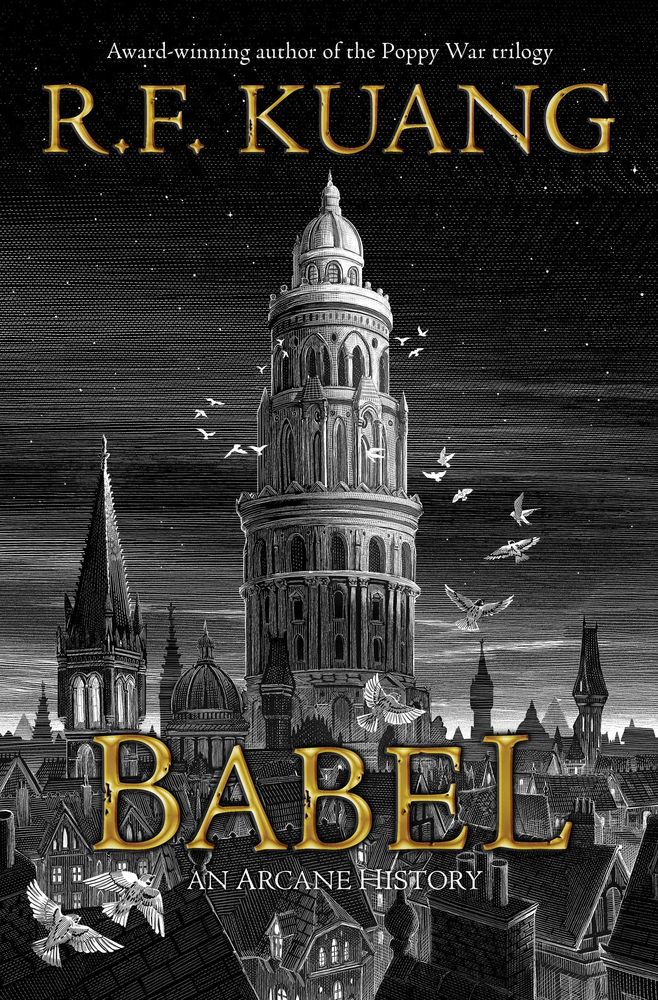

The fact that I only recognize four of the ten musicians at the heart of Kate Molleson’s book tells me I’m going to learn something!
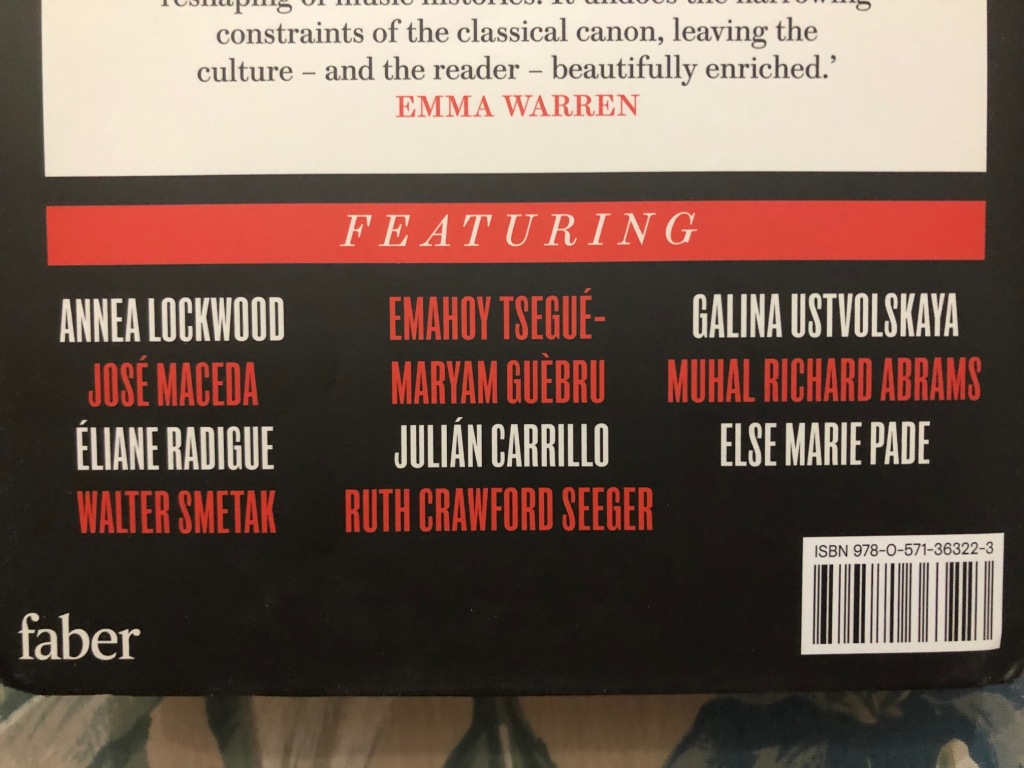
Some Videos
As mentioned on the June 15, 2022 edition of Horizons, here are some videos of the three featured performers.
Caroline Shaw and Sō Percussion with their official video for “Other Song” from the album Let The Soil Play Its Simple Part.
Gabriel Kahane and over 50 musicians performing “Empire Liquor Mart (9127 S. Figueroa St.)” in a performance from the Apartment Sessions.
Errollyn Wallen performing “The Errollyn Wallen Songbook” in a 2010 concert.
Robert Simpson’s Symphony No. 9
Outside the United Kingdom, the music of Robert Simpson (1921-1997) hasn’t received much attention. Even within the U.K., his works are performed and recorded only occasionally these days. He was once, however, well-known as a BBC producer and writer as well as composer.
Inspired by a recent online discussion I happened upon, I returned to Simpson’s music recently. I can’t say that I know his output that well, but I’ve heard several of his major pieces. One that, in listening to it again several times, struck me particularly powerfully – and which was apparently the composer’s own favorite of his works – is the Symphony No. 9 of 1985-87. It’s a very forceful, intellectually stimulating but also viscerally gripping, work, worthy of more attention and discussion.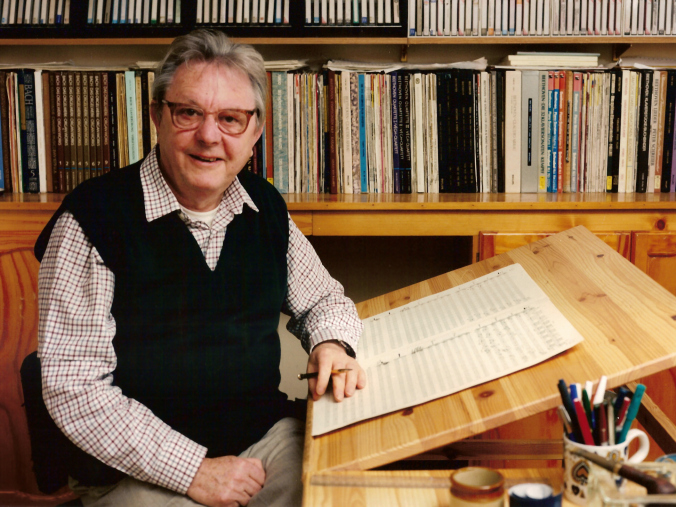
Robert Simpson was born in Leamington Spa, Warwickshire, England. He studied at Westminster School, thinking that he might go into medicine as other members of his family had. But music won out. During World War II, as a conscientious objector, he served with a mobile surgical unit, while also continuing his music studies with composer Herbert Howells. Simpson ultimately received a Doctor of Music degree from Durham University.
In 1951, he joined the music staff of the BBC, where he worked for over thirty years as a much-respected broadcaster and producer. In that position, he championed the music of composers like Gustav Mahler, Havergal Brian, and Carl Nielsen. Later, however, he butted heads with BBC management about cost-cutting and reorganization efforts, eventually resigning when he made his dissatisfaction known too publicly. In 1986, he moved to the Republic of Ireland, where he died in 1997 at age seventy-six after suffering for years from the effects of a debilitating stroke.
The balance of Simpson’s catalog of compositions is interesting. He seems to have had little interest in vocal music, and wrote only a handful of chamber and orchestral works, including four concertos, outside of his main focus, perhaps the two most serious of instrumental forms – the string quartet, of which he produced fifteen (the same number as Dmitri Shostakovich), and the symphony, of which he completed eleven (with another four early symphonies allegedly destroyed).
Along with his music, Simpson also wrote much, specifically books and essays on the music of Ludwig van Beethoven, Anton Bruckner, Jean Sibelius, and one of his heroes, Carl Nielsen. His Carl Nielsen, Symphonist (1952) and The Essence of Bruckner (1967) are still very well-regarded. In 1980, a Robert Simpson Society was created by his fans who wanted to make sure his work remained in the public eye. Its website is a treasure trove of information on Simpson.
In an obituary, Martin Anderson called Simpson “arguably Britain’s most important composer since Vaughan Williams; he was certainly one of the century’s most powerful and original symphonists anywhere.”
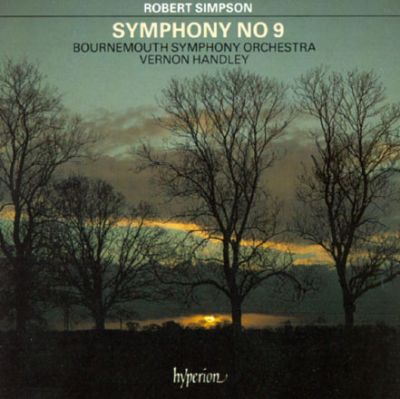
The Symphony No. 9 – described in an oft-quoted Gramophone review as “as hypnotic as the star-filled night sky” – was composed over the years 1985 through 1987. Commissioned by the Bournemouth Symphony Orchestra, with funds provided by the Arts Council of Great Britain, the symphony is dedicated to Simpson’s wife Angela. It was first performed by the Bournemouth Symphony Orchestra under the direction of Vernon Handley in Bournemouth on April 8, 1987.
Steven Vanhauwaert
Pianist Steven Vanhauwaert was the special guest on the October 7, 2020 edition of KNCJ Wednesday Evening Classics. He and host Chris Morrison discussed Vanhauwaert’s two new recordings, a duo recital with violinist Ambroise Aubrun featuring music by and associated with composer Eric Zeisl, and “Ferruccio Busoni: L’Énigme,” a collection of solo piano music by that great pianist, composer, editor, and theorist. Both are on the Editions Hortus label, and can be purchased at Vanhauwaert’s website stevenpiano.com and other online sources.
Here is that October 7, 2020 conversation from KNCJ Wednesday Evening Classics.
Chen Yi: Five Recordings
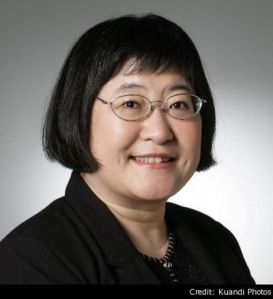 Chen Yi is one of the most acclaimed composers of our time. One of the keys to her musical makeup is the way Chinese and Western elements are so distinctively fused in her music. Although born in China, she was brought up in the world of Western classical music, which she encountered through her parents and in the early years of her education. Once she became immersed in Chinese traditional music in her teens, though, the nature of her music changed. Her roots in Chinese music are evident in many of her compositions, in which one hears hints of the sound of folk songs and opera, Chinese scales and tuning, and traditional Chinese instruments, either the actual instruments or her evocations of them by Western instruments.
Chen Yi is one of the most acclaimed composers of our time. One of the keys to her musical makeup is the way Chinese and Western elements are so distinctively fused in her music. Although born in China, she was brought up in the world of Western classical music, which she encountered through her parents and in the early years of her education. Once she became immersed in Chinese traditional music in her teens, though, the nature of her music changed. Her roots in Chinese music are evident in many of her compositions, in which one hears hints of the sound of folk songs and opera, Chinese scales and tuning, and traditional Chinese instruments, either the actual instruments or her evocations of them by Western instruments.
Chen Yi was born in the southern port city of Guangzhou on April 4, 1953. Her family was accomplished and musical – both of her parents were doctors and also played instruments (her mother the piano, her father the violin) – and Chen Yi and her brother and sister were all brought up with music. Chen Yi began studying piano and violin at the age of three. But with the onset of the Cultural Revolution in 1966, education and the arts were frowned upon. Her father and older sister were sent away to work camps. As Chen Yi later recollected, “As with many other Chinese ‘intellectuals’ during the Cultural Revolution, my family and I couldn’t escape from the suffering of having our home searched, of being compelled to perform forced labor, of having to engage in public self-criticism, and of having to live our lives under the persistent stress of political pressure. The target of the Cultural Revolution was always the people who had an education, especially if they had been exposed to Western culture.”
Chen managed to continue her musical studies in secret. When she was fifteen, she and the rest of her family were sent to do forced labor in the countryside. “We had to climb up and down a mountain carrying rocks,” she told the San Francisco Chronicle. “I carried more than 100 pounds on my back, and would go up and down sometimes 20 times in a day.” Chen was allowed to have her violin with her, but was expected to play only revolutionary songs to inspire local workers. When alone, she continued to play classical pieces she had memorized, and started improvising her own compositions. During this time, Chen established and maintained her close connection with Chinese folk culture.
Two years later, the seventeen-year-old Chen was allowed to return to Guangzhou and became the concertmaster of the orchestra of the Beijing Opera Troupe. The ensemble, as decreed by the government, mixed Chinese and Western instruments, and Chen learned to play a number of Chinese instruments during her time with the Troupe. She also had a chance to hone her composition and arrangement skills.
But it was only when she started studying at the Central Conservatory of Music in Beijing that she made the official move from violin playing to composing. She was the first Chinese woman to receive a Master of Arts in music composition from the Central Conservatory, where she studied from 1978, the year that the Conservatory reopened after years of being shuttered, to 1986. Among her fellow students in that group of internationally-renowned composers now known as the “Class of 1978” were her future husband, composer Zhou Long, as well as Tan Dun and Bright Sheng.
Soon after graduating, she made her way to New York, working with Chou Wen-chung and Mario Davidovsky at Columbia University, where she completed her doctorate. By now she was producing a steady stream of new compositions. At one point in the 1990s she held resident composer positions with three prominent Bay Area-based groups: the Women’s Philharmonic Orchestra, the Aptos Creative Arts Center, and the a cappella chorus Chanticleer. From 1996 to 1998, Chen taught composition at the Peabody Conservatory in Baltimore. Then in 1998, Chen and her husband Zhou Long joined the faculty of the University of Missouri at Kansas City Conservatory of Music and Dance. The following year Chen became a United States citizen.
Since then, Chen Yi has maintained a busy career of composition and teaching. Her works have been commissioned and performed by artists and ensembles all over the world. She was a finalist for the 2006 Pulitzer Prize for Music for her composition Four Seasons. She has won the Lieberson Award and the Charles Ives Living Award from the American Academy of Arts and Letters, along with fellowships from the Guggenheim Foundation and the National Endowment for the Arts. She was herself elected to the American Academy of Arts and Letters in 2019.
Mason Bates: The (R)evolution of Steve Jobs
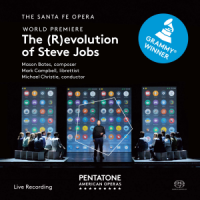 The arc of the life of Steve Jobs is pretty well-known in the popular culture, and has been detailed in a number of films and books. Herald of the personal computer era and the co-founder of Apple Computer, Jobs was a college dropout that started as a video game designer but soon went into business with his longtime friend Steve Wozniak. They designed a new personal computer that was an immediate success. Subsequent issues, though, led to his firing from Apple. Other ventures, including the building of Pixar into a major animation studio, led to Jobs’s return to Apple and the creation of the iMac, iTunes, iPod, and, of course, the iPhone. But he contracted cancer, and died in 2011 at age 56. Jobs was a complicated person and led a complicated life, one possibly ripe for operatic treatment.
The arc of the life of Steve Jobs is pretty well-known in the popular culture, and has been detailed in a number of films and books. Herald of the personal computer era and the co-founder of Apple Computer, Jobs was a college dropout that started as a video game designer but soon went into business with his longtime friend Steve Wozniak. They designed a new personal computer that was an immediate success. Subsequent issues, though, led to his firing from Apple. Other ventures, including the building of Pixar into a major animation studio, led to Jobs’s return to Apple and the creation of the iMac, iTunes, iPod, and, of course, the iPhone. But he contracted cancer, and died in 2011 at age 56. Jobs was a complicated person and led a complicated life, one possibly ripe for operatic treatment.
Enter Mason Bates, a rare combination of acclaimed classical composer and dance music DJ, as well as the most-performed composer of his generation in a recent survey of American music. Born in 1977, Bates won a Guggenheim Fellowship in 2008, was the first composer-in-residence at the Kennedy Center for the Performing Arts, and was Musical America Composer of the Year for 2018. A large part of that latter award was likely due to the acclaim won by his first opera The (R)evolution of Steve Jobs, which was premiered in 2017 by the Santa Fe Opera and was a huge hit, selling out multiple performances. The recording of the opera on Pentatone Records won the 2019 Grammy for Best Opera Recording.
When Bates initially had the idea for the opera, he sought out librettist Mark Campbell, who won a Pulitzer Prize in 2012 for his libretto for the Kevin Puts World War I opera Silent Night. Campbell found out all he could about Jobs and Apple, and picked out a set of key themes and incidents that could be structured in operatic form. As to the main characters, as Bates has written, “Mark soon fell in love with the complex, duel protagonist-and-antagonist role of Jobs; the soulful figure of Laurene Jobs; and the mystical character of Kōbun, the Buddhist spiritual adviser to Jobs.”
In the opera, Bates and Campbell give, in one assessment, an “intimate perspective of a public life, examining the people and experiences that shaped Steve Jobs: his father, his Buddhist practice, his rise and fall as an executive, and finally his marriage to the woman who showed him the power of human connection.” But the events of Jobs’s life that the opera focuses on – Jobs’s youth in the 1960s, his initial work with Steve Wozniak and the founding of Apple in the 1970s, his discovery of Buddhism, the ups and downs of the 1980s, his marriage and professional comeback, the launch of the iPhone, and his death in 2011 – are arranged in an unusual, non-linear way, jumping back and forth in time. The twenty-four episodes – a prologue, eighteen scenes, four instrumental interludes, and an epilogue – form a single act in what Bates has called a “‘pixelated’ structure” that allows the events and characters to interact and comment on one another.
Bates’s music features his usual blend of the acoustic and the electronic. Each of the characters has her or his characteristic sound. An acoustic guitar, for instance, is associated with Jobs throughout the opera, often with electronic sounds in the background that help depict his busy, fragmented life – sounds that Bates in large part derived from Mac products, little electronic noises from hard drives and keyboards. Later, by contrast, the appearances of Kōbun Chino Otogawa, Jobs’s spiritual adviser and the person that helped him to convert to Buddhism, are accompanied by calm music, including alto flute and electronically-processed Japanese wind chimes, prayer bowls, and gongs. Jobs’s wife Laurene is accompanied by soaring strings and consonant harmonies – she, after all, is the reconciling force in the opera between Jobs’s multiple facets, positive and negative. Jobs’s girlfriend Chrisann Brennan tends to be accompanied by flutes, and his partner and friend Steve Wozniak by saxophones.
The following listening guide for the opera is based on the aforementioned recording of the opera on Pentatone Records, which features Edward Parks (baritone, Steve Jobs), Sasha Cooke (mezzo-soprano, Laurene Powell Jobs), Wei Wu (bass, Kōbun Chino Otogawa), Garrett Sorenson (tenor, Steve “Woz” Wozniak), Jessica E. Jones (soprano, Chrisann Brennan), Kelly Markgraf (baritone, Paul Jobs), Mariya Kaganskaya (mezzo-soprano, Teacher), and the Santa Fe Opera Orchestra conducted by Michael Christie. The entire recording can be found on YouTube; selected highlights are included below.
Prologue
1965: The garage of the Jobs family home, Los Altos
We hear the musical sounds associated with Steve Jobs (“Steve” from hereon), acoustic guitar and electronic noises, in this initial scene, in which Steve receives his father Paul’s encouragement along with the present of a workbench. Immediately noticeable is the accessible, melodic nature of the vocal writing.
Overture
A minimalist, rhythmically lively transition as the stage changes.
Scene 1
2007: Product Launch, the stage of a convention center, San Francisco
Steve is at the famous 2007 convention at which he announced the iPhone, extolling his “one device” that “does it all,” with a mere “tap” taking care of so many of one’s needs. There’s lively syncopation and building energy in the music as the chorus/audience expresses its excitement, as well as some skepticism. As Steve’s energy flags – a hint of his health problems to follow – the music calms for his exchange with his wife Laurene.
Continue reading “Mason Bates: The (R)evolution of Steve Jobs”
Two Online Events
Every now and then, we’ll let you know about upcoming new music events at this blog. Here are two online concerts you might want to check out, including one this very evening:
Sarah Cahill Performs The Future is Female
Friday, June 5, 2020, 8:00 p.m. PDT
Tonight at 8:00 p.m. PDT, the wonderful Sarah Cahill, a pianist truly dedicated to new music, will present a recital of music from the twentieth and twenty-first centuries by women composers from around the world. The repertoire is wide-ranging, from the 1930s and Grażyna Bacewicz to Germaine Tailleferre in the 1950s, Sofia Gubaidulina in the 1960s, and very recent pieces by Gabriela Ortiz and Elizabeth A. Baker. This concert is a part of Cahill’s larger project, The Future is Female – which she describes as “a ritual installation and communal feminist immersive listening experience” – that encompasses compositions by women ranging from the eighteenth century to the present.
The livestream is available with a suggested donation to benefit two organizations that have been affected by COVID-19, Old First Concerts and Compass Family Services (which provides a variety of services to homeless families).
Find out more, donate, and see the concert here
*
The Bang on a Can Marathon 2020 Continues!
Sunday, June 14, 2020, 12:00 p.m. PDT
Back in May, Bang on a Can, the New York-based organization that has so enthusiastically fostered the creation of new classical music, presented a six-hour online marathon of performances. I was one of the 22,000 people that tuned in for a good portion of it, and truly enjoyed both the quality of the performances and the variety of music. On Sunday, June 14 at noon PDT, they will present yet another six hours of live music online. Something like 25 performances will be featured – from the U.S., Canada, Czech Republic, Switzerland, Scotland, Italy, Ireland, and Japan – including no fewer than ten world premieres of pieces written especially for the occasion!
You’ll hear performances by the likes of pianists Conrad Tao (well-known to Reno audiences) and Nico Muhly, violist Nadia Sirota, Leila Adu, Shara Nova (My Brightest Diamond), the great clarinetist-composer-scholar Don Byron, Pamela Z, ECM artist Helena Tulve, experimental composer Alvin Curran (with a piece for shofar and portable cement mixer!), the legendary Roscoe Mitchell (co-founder of the Art Ensemble of Chicago), and, to conclude the proceedings, another legendary figure, Terry Riley, performing from the middle of a rice field in Japan!
The Marathon will be free to stream, but a ticket purchase would be appreciated.
Find out more, purchase a ticket, and watch the Marathon here
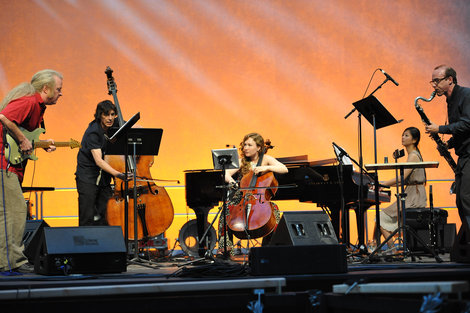
Five Jennifer Koh Recommendations
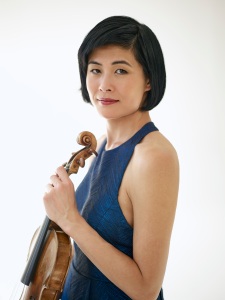
In the world of violin stars, Jennifer Koh stands apart for her dedication to new music. It’s not as though she ignores the standards of the repertoire – she regularly performs Bach and Vivaldi, and, as one of her recordings exhibits, she can play a mean Tchaikovsky Violin Concerto. But she has also given the premieres of literally dozens of works written specially for her.
Her resume is marked by a number of special projects, including Limitless (see below), The New American Concerto – a multiple-season project in which Koh performs newly-composed violin concertos that engage in various ways with social issues – and juxtapositions of old and new like Bach and Beyond and Bridge to Beethoven, which respectively paired Bach’s solo violin works and Beethoven’s violin sonatas with more recently-composed works.
More recently, Alone Together, a new commissioning project designed in part to support composers during the coronavirus pandemic, was launched in April 2020. Twenty-one composers, most with salaried positions and donating their work and commission fee, were asked to write a “micro-work” of between thirty seconds and one minute, and at the same time recommended a fellow freelance composer, many young and struggling financially due to COVID-19, to create a similarly short work on a commission paid through the nonprofit Arco Collaborative that Koh founded and directs. Koh has been presenting these works live on Facebook and Instagram. The music and associated interviews are also available on YouTube.
Born to Korean parents in Illinois, Jennifer Koh made her public debut with the Chicago Symphony Orchestra at age 11. She received a Bachelor of Arts degree in English literature from Oberlin College, and then went on to study at the Curtis Institute with Jaime Laredo, with whom she has recorded an album of duo concertos, and Felix Galimir. She is a recipient of an Avery Fisher Career Grant, was a top prize winner at the famous Tchaikovsky Competition in Moscow, and was Musical America’s 2016 Instrumentalist of the Year.
Koh has over a dozen recordings to her credit, and has in recent years produced a series of highly interesting albums for the Cedille label. Here are five of her Cedille albums that focus on new music and are particularly worth seeking out.
